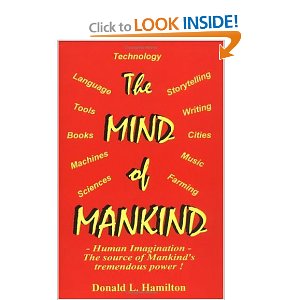
Donald Hamilton
Suna Press, 1996, 210 page
In the author's own words online:
Human Imagination
An eagle may have much keener eyes then ours but it cannot “see” the things that we can.
EVOLUTION BY DESIGN “Predetermined Randomness”
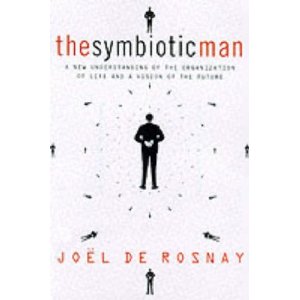
The Symbiotic Man: A New Understanding of the Organization of Life and a Vision of the Future
Joel De Rosnay (Author)
In this Future Shock for the new millennium, de Rosnay, director for strategy for the Science and Industry Complex in Paris, predicts the coming of what he calls the “Cybiont”: a global “macroorganism” that encompasses humanity, the environment and technology. The culmination of de Rosnay's earlier work (The Macroscope; The Paths of Life; The Planetary Brain), this book became a bestseller upon its initial publication in France in 1995. The author regards the computer as a “macroscope,” an instrument that lets humans view larger trends and that will eventually take on a life of its own; he quotes Stephen Hawking's view that computer viruses and other electronic “intelligence” may actually be developing into forms of life. For mankind to survive, we must establish close symbiotic relationships with our technology and its emerging self-generated intelligence and with nature, he says. Unfortunately, de Rosnay fails to consider very deeply what constitutes consciousness, a subject many other scientists have investigated, or artificial intelligence. He also seems to overestimate humans' willingness to sacrifice their private interests to achieve long-term, communal goals. De Rosnay does, however, present many provocative ideas like “fractal time” and “time bubbles,” and he discusses interesting and thus far fairly esoteric advances in technological sensory perception and even brain-computer connections. This book doesn't come together as a convincing vision of the future, but it certainly provides readers with many challenging ideas to mull over, and it may encourage them to consider their individual roles in the greater scheme of things.
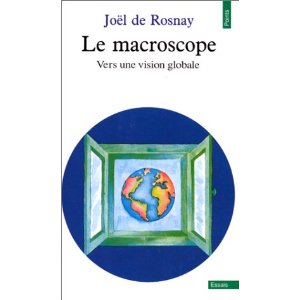
The Macroscope; The Paths of Life; The Planetary Brain
in US: The macroscope: A new world scientific system
See Also:
Worth a Look: Book Reviews on Bio-Economics
Worth a Look: Book Reviews on Civilization-Building
Worth a Look: Book Reviews on Collective Intelligence
Worth a Look: Book Reviews on Common Wealth
Worth a Look: Book Reviews on Conscious, Evolutionary, Integral Activism & Goodness
Worth a Look: Book Reviews on Dialog for Truth & Reconciliation
Worth a Look: Book Reviews on Diversity of Voices & Values (Other than USA)
Worth a Look: Book Reviews on Diversity of Voices & Values (USA)
Worth a Look: Books Reviews on Education for Freedom & Innovation
Worth a Look: Book Reviews on Evolutionary Dynamics
Worth a Look: Book Reviews on Innovation
Worth a Look: Book Reviews on Leadership for Epoch B
Worth a Look: Book Reviews on Self-Determination & Secession
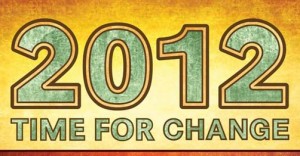
Film Review: “2012: Time for Change”
Opening This Weekend in NYC, Playing in LA again this week as well, it’s:
A Film that Will Change the World
by Sander Hicks
If I told you I just saw a great movie named “2012: Time for Change” you may think I’m talking about the 2009 Roland Emmerich disaster movie. That flashy flick was wildly successful at the box office, but it’s described as “cinematic waterboarding,” and worse, by most critics. So how did it make $567 million? Maybe it tapped into that nagging little voice we all have, which says that if we do not change how we live, we face planetary catastrophe, a global environmental meltdown, in full-color HD.
“2012: Time for Change” is different. It’s a lively, smart documentary that weaves a more hopeful vision from over 200 voices and visionaries. The film works as a kind of collaborative brainstorm: Yes, we are destroying the planet, with our patterns of consumption, competition, war and blindness. The Asian Tsunami, Hurricane Katrina, and even now tornados in Brooklyn show that the Earth has just about run out of patience with us human beings.
Continue reading “Review (Guest): Film Review–“2012: Time for Change””

From the Library Journal: He identifies and explains seven distinct stages of the creative process: discovery and encounter, passion and commitment, crisis and creative frustration, retreat and withdrawal, epiphany and insight, discipline and completion, and responsibility and release. He also develops his view of the three principles of the creative impulse, which include creative courage, being in the right place at the right time, and deepening connections with others.
Know the enemy, know yourself, wrote Sun Tzu in his classic The Art of War, and your victory will be certain. For anyone who is stuck at a level below their God-given potential, who can't seem to get on track to do the things they need to do in order to achieve their most authentic goals, knowing the enemy and knowing yourself are one and the same.
Steve Pressfield's magnificent little book The War of Art is about being more creative – but more important, it's also about fulfilling your potential as a human being. To do this, he says, you must overcome Resistance (the “R” is capitalized be Pressfield to represent the fact that it is a very real entity – as real to your authentic Self as Charles Manson or Genghis Khan were to their victims).
Continue reading “Review (Guest): The War of Art–Break Through the Blocks and Win Your Inner Creative Battles”
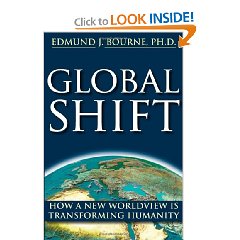
![]() Phenomenal Integration of Ideas–Superb “Once Over”
Phenomenal Integration of Ideas–Superb “Once Over”
February 10, 2010 [final review 21 February 2010]
Edmund J. Bourne
I have sent INTELLIGENCE for EARTH: Clarity, Diversity, Integrity, & Sustainaabilty to the printer and it is on that foundation that I highly recommend this book for a simple easy to understand overview of the fifteen converging forces that the author lists and then discusses in superbly-crafted very easy to read overviews. He covers:
01 A conscious universe
02 Multidimensional reality
03 Interconnection of all minds
04 Complementarity of science and spirituality
05 Radical empiricism [revalidation of intuition and visioning]
06 Consciousness has a causal influence
07 Natural ethics [I really like this, hugely beneficial for all]
08 Reverence for nature and earth [in my book, diversity rocks]
09 A sense of inclusiveness toward all humanity [diversity again]
Continue reading “Review : Global Shift–How A New Worldview Is Transforming Humanity”

It took me fifty years to recognize the deficiencies of the command and control or top down elite-dominated model of governance, and to discover the spiritual and practical integrity of collective intelligence, openness, appreciative inquirty, deliberative public dilaog, and so on. It's taken another seven years to discover detachment from outcome, and that in turn set the stage for what I find to be the absolute essence of this book: speaking truth to power is half the battle, losing the anger is the other half. Harder to do than it sounds, this Westernized version of the Bhagavad Gita does help.
Here are the two paragraphs I pulled from page 129 and then 147 for intelligence (decision-support) professionals:
“Those who transcend the gunas are in essence watchers, beyond the worldly. Although constantly aware of the inevitable cycle of birth, disease, senility, grief, and so forth, they dwell above it all, and merely witness it.
My personal take on the above is that sacred dispassion is a prerequisite for both spirtual vision and professional integrity.
“Always tell the truth, Arjuna, and present it in as pleasant a way as possible. If you cannot do that, remain silent. If something absolutely needs to be said, you must uphold the truth, but find a way to do it that is gentle and obliging.”
Talk about one's life flashing past–A for truth, F for gentle. Something to work on in my last 20 years.
Continue reading “Review: The Bhagavad Gita–A Walkthrough for Westerners”
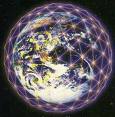
![]() Extraordinary Book
Extraordinary Book
January 23, 2010
Hans Swegan
This book is available immediately from WHSmith. I recommend it without reservation, it is in my top dozen books on the World Brain – Global Brain -Global Mind – Collective Intellgence reading area.
Amazon seems to be deleting a lot of reviews from top reviewers, which I find quite annoying. Indeed, Amazon has become so unreliable, on top of being unresponsive to years of requests for simple changes (e.g. being able to access all reviews by a specific reviewer against a specific search such as “World Brain” that I finally created Phi Beta Iota the Public Intelligence Blog, where you can access all reviews in each each of 98 reading categories, all leading back to Amazon, but not dependent on Amazon.
This book is extraordinary in that is directly connects information to DNA and makes an absolutely fascinating case for how every single atom on the planet is an information element, and all of the atoms in the whole are the Global Mind.
There are no notes, and normally this would set me off, but I found the personal reflections of this author so utterly extraordinary that I can not find fault on this point.
Other books I recommend along with this one:
Continue reading “Review: Global Mind”